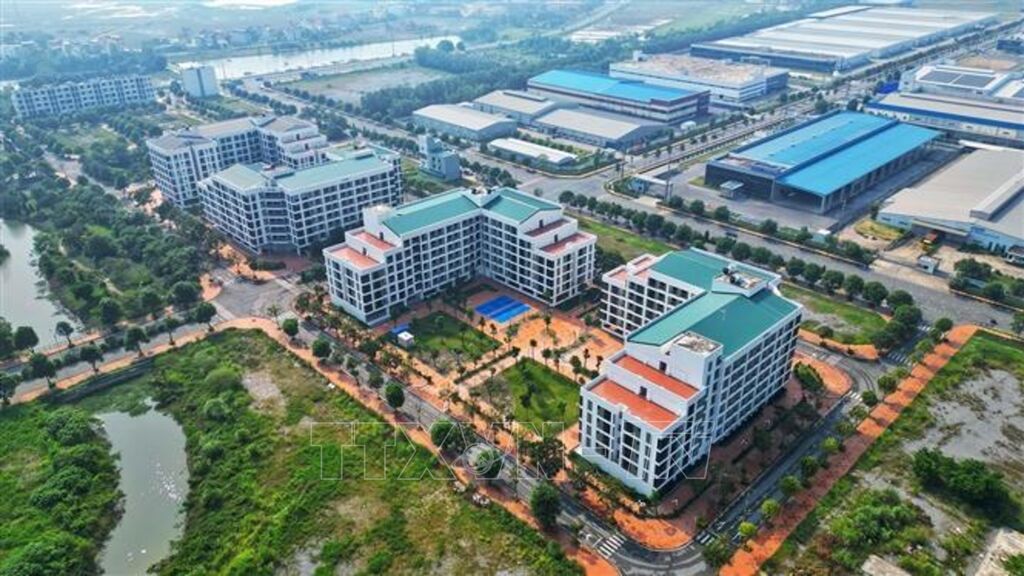 |
| A housing project for workers, built by Viglacera Corporation, in Dong Van 4 Industrial Park in Ninh Binh province __Photo: Tuan Anh/VNA |
Expanding eligibility, lowering lending rates, and supporting vulnerable groups
One of the major revisions introduced under Decree 261 concerns income thresholds for those eligible to buy, rent, or lease-purchase social housing. The new regulation raises the income ceiling to a maximum monthly take-home income of VND 20 million for single persons and VND 40 million for married couples. This expansion allows more workers, public employees, and individuals without housing to benefit from social housing policies.
The adjustment particularly reflects the realities of major urban areas such as Hanoi and Ho Chi Minh City, where both income levels and living costs are higher. Notably, the decree authorizes provincial-level People’s Committees to flexibly adjust income coefficients according to local conditions, for example, up to VND 52.4 million per month for couples in Ho Chi Minh City. As a result, thousands of workers who were previously ineligible now meet the criteria. A separate provision also raises the income limit for single parents with small children to VND 30 million per month, reflecting both fairness and social empathy.
Alongside these changes, the decree introduces a record-low lending rate of 5.4 percent per year, compared to the previous 6.6 percent. The 1.2-percent reduction translates into significant savings, around VND 120 million for a VND 800 million loan over 15 years. The new rate applies to both new and existing loans, easing the financial burden on households already repaying debts.
In addition, income verification procedures have been simplified, especially for informal and industrial park workers. Commune-level public security offices will confirm income based on population data within seven days, helping make policy access more straightforward and transparent. These adjustments demonstrate the Government’s concern for vulnerable groups, enabling them to secure stable housing and peace of mind in daily life.
Addressing land and administrative bottlenecks
Decree 261/2025/ND-CP also revises regulations on developers’ obligations to allocate land for social housing in commercial projects. Instead of directly reserving 20 percent of residential land for social housing development, investors are now allowed to pay an equivalent monetary amount, along with an additional 3-percent-per-year fee calculated on the land-use value of that portion, in line with the approved progress of infrastructure completion.
The payment includes two components: the land use levy for 20 percent of the residential land area, determined under the Land Law, and a proportionate amount covering the cost of technical infrastructure development. The latter is calculated based on the ratio of the 20-percent residential land area to the total project area multiplied by total infrastructure investment costs, excluding land reclamation or sea reclamation expenses where applicable.
This monetary substitution mechanism is expected to resolve inconsistencies in valuation and collection, ensuring transparency and uniform implementation across provinces while easing the process for developers. The decree also provides clear guidance for handling overlapping or duplicate social housing project proposals. When multiple investors propose projects on the same land plot, priority will be given to those with lawful land use rights; if none, preference will go to the earliest applicant.
These provisions fill a previous legal gap, reduce disputes among investors, and establish a clear basis for receiving and processing project proposals, thereby accelerating the expansion of social housing stock.
Overall impact and path toward sustainable development
The revisions introduced by Decree 261/2025/ND-CP not only address procedural bottlenecks but also create momentum for comprehensive and efficient social housing development. Clear rules on fees, taxes, and administrative processing help businesses cut costs and time, encouraging investment in social housing projects and thereby expanding supply at reasonable prices to meet growing demand.
At the same time, adjustments in income thresholds, lending rates, and administrative procedures broaden access for workers, civil servants, and other disadvantaged groups. The integration of legal, financial, and credit mechanisms marks an important step toward realizing the national target of one million social housing units by 2030, thus ensuring social security, improving living standards, and promoting sustainable socio-economic growth.- (VLLF)









